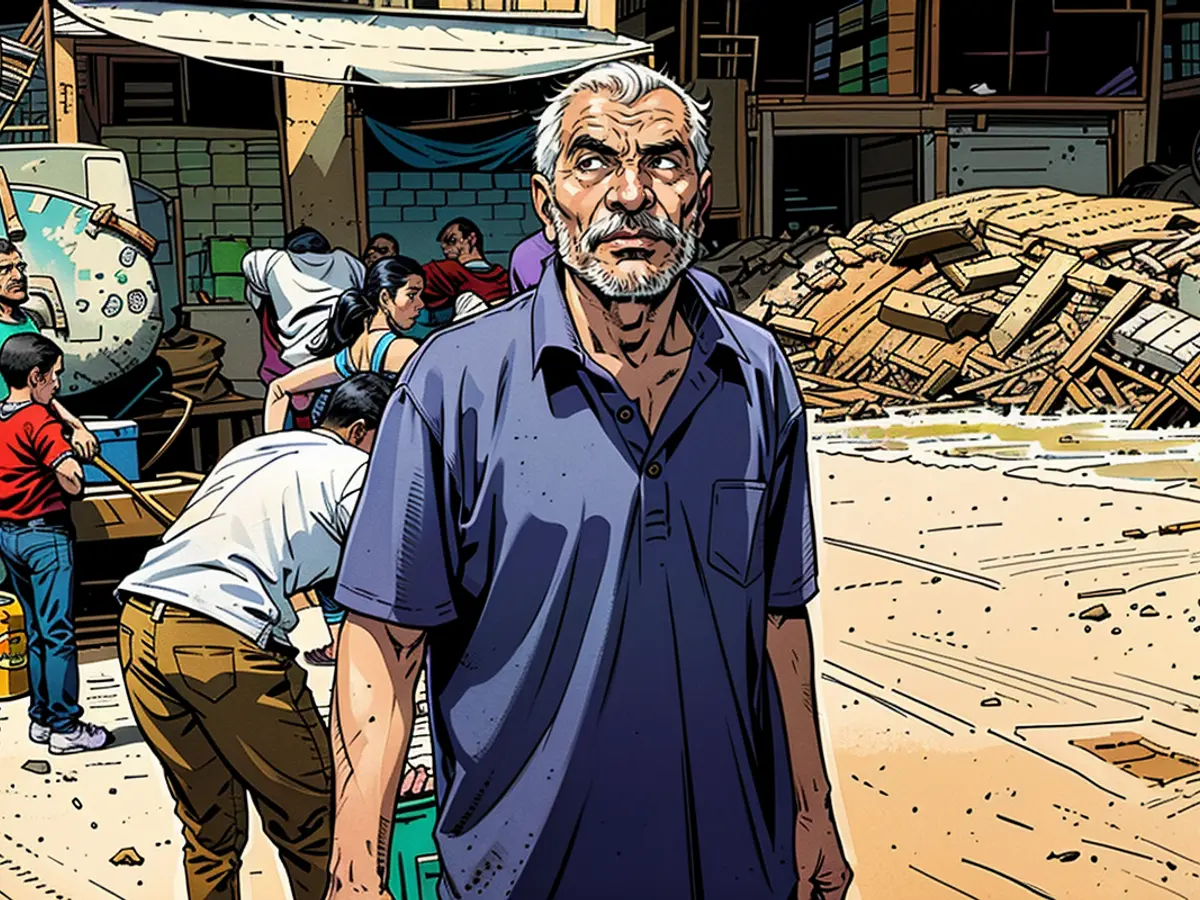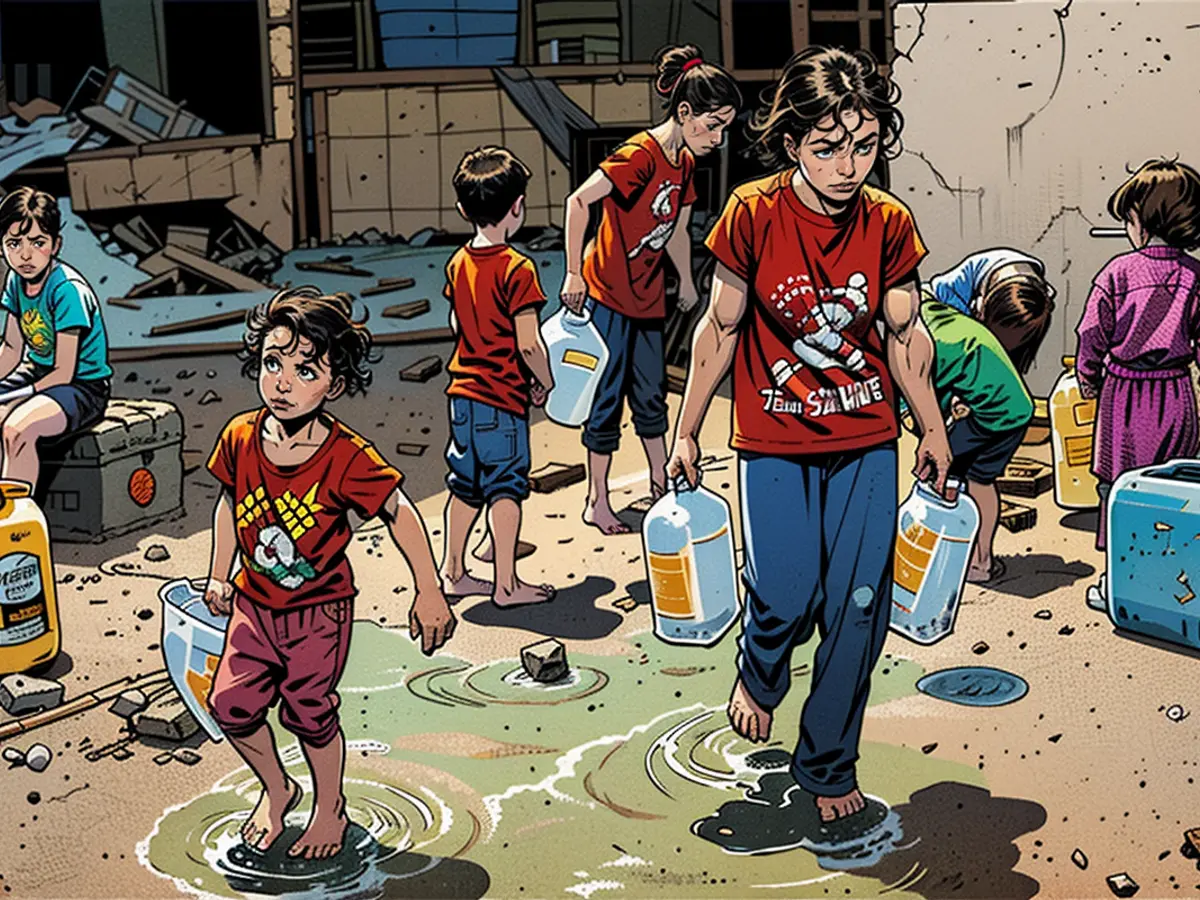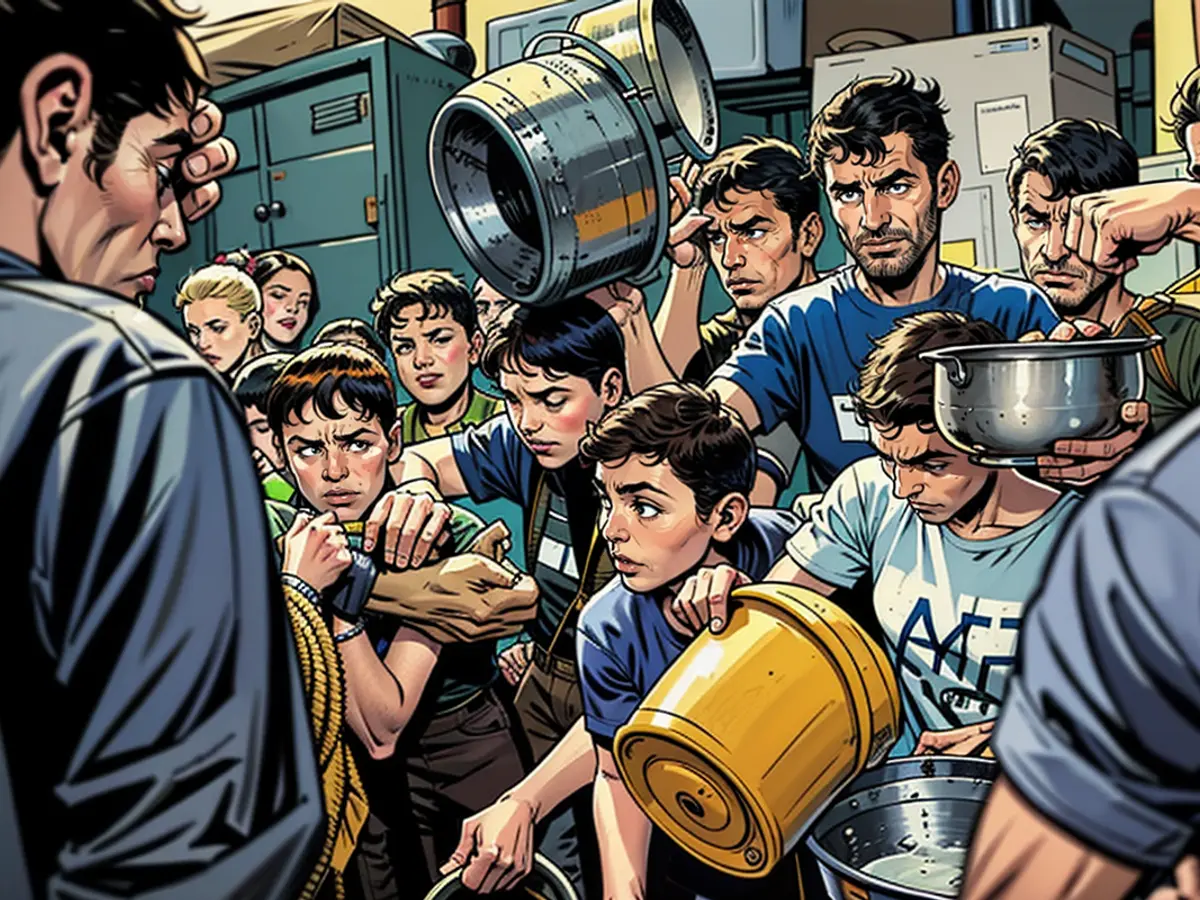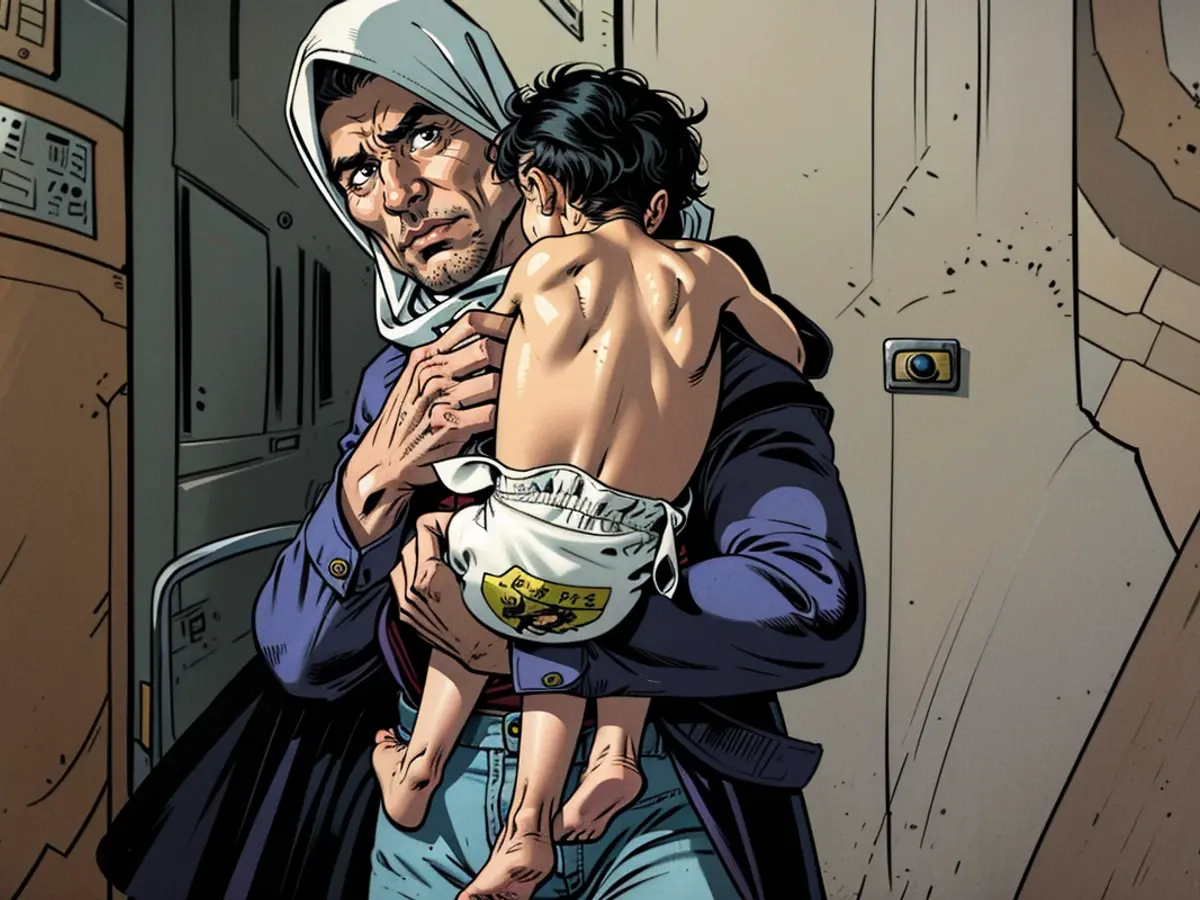Youngsters are succumbing to hunger in their parents' embraces as famine quickens its grip on Gaza.
A 9-year-old Palestinian lad lies in his mom's arms, gravely weakened due to extreme malnutrition and battling dehydration. His baggy blue sweatpants are barely clinging to his skeletal legs, while his distended orange T-shirt reveals a prominent ribcage.
His mother, Ghanima Juma’a, implored the public with compassion to aid her in finding medical care for her son so he can recover. She shared her heart-wrenching plea last week at a hospital in Khan Younis, expressing her fear of losing her son before her very eyes.
Two months ago, the family was forced to leave their home in Rafah as Israel intensified its attacks in the area. Now, they struggle to survive in the polluted coastal region of Asda’a—near Al-Mawasi tent camp—where they can barely find food, water, or even protection from the scorching heat of Gaza.
"We are forced to move from one place to another due to the war and the invasion... Life is incredibly hard", his mother lamented. "We don't even have a tent to shelter us."
Israel's conflict in Gaza has severely strained the territory's healthcare system, forcing medical staff to turn away parents begging for baby formula, and even turning away young patients with chronic illnesses exacerbated by malnutrition.
As Israel continues to enforce its blockade on Gaza, preventing aid groups from bringing in sufficient food supplies, parents express that they have no choice but to watch their children waste away due to starvation. Over eight months of bombing and destruction have demolished infrastructure, obliterated communities, and reduced entire neighborhoods to rubble. Sanitation systems, already challenged by water shortages resulting from extreme heat, have been severely damaged, according to the UN, making clean water scarce.
A report published Tuesday by the Integrated Food Security Phase Classification (IPC) predicted that nearly all of Gaza will face starvation within the next three months.
The UN’s food agency previously warned that southern Gaza could soon experience the same "catastrophic levels of hunger" previously seen in the north, where Israel focused its early military offensive.
At least 34 children have already died of malnutrition in Gaza, according to government reports on June 22. The actual number could be higher, as restrictions on aid access in Gaza have hindered efforts to fully evaluate the crisis. Over 50,000 children require treatment for acute malnutrition, according to the UN's agency for Palestinian refugees (UNRWA).
Israel began its military operation in Gaza following the Hamas-led October 7 attacks on southern Israel, resulting in the deaths of at least 1,200 people and the abduction of more than 250 others.

Since then, Israeli attacks in Gaza have claimed the lives of 37,658 Palestinians and injured another 86,237 people, according to health officials in Gaza.
Severe water scarcity
Ayoub, the young boy from Gaza's south, suffers in his mother's arms, while children in the northern regions struggle with food shortages for even longer. In Jabalya refugee camp, they line up at a water truck, with perspiration dripping down their faces as they navigate the debris-strewn streets.
desperate Gazans crowd together to access water as aid workers distribute thick, steaming red soup from large saucepans.
Scarce resources include food and clean water. In the north, Gazans have resorted to drinking polluted water, which provides little relief against their dehydration and promotes the spread of infectious diseases.
Israel claims that there are "no restrictions" on the amount of aid that can enter Gaza, but its inspections of trucks, restrictions on land routes, and increased bombardment mean that aid is barely trickling in. Even when it does reach the besieged territory, the risk of hungry Palestinians fighting over convoys complicates distribution efforts. UN Secretary General António Guterres recently cautioned about the absence of police authorities in Gaza during the conflict leading to "total lawlessness."
Earlier this year, the UN warned that Israel is creating "an entirely man-made disaster" in Gaza. Israeli Prime Minister Benjamin Netanyahu has denied allegations by the International Criminal Court's chief prosecutor that he has used "starvation as a method of warfare."
"The only water we have is what we receive as aid. People are suffering immensely as a result", said one local resident named Hassan Kalash. "We are ill and don't have the energy to transport the water... The water pipe is broken. We do not have water infrastructure."
Civilians in the area reported that they don't have access to running water, and rely solely on aid convoys for their limited water supply. Over 67% of water and sanitation facilities in the Gaza Strip have been destroyed or damaged during the eight months of bombing, according to UNRWA. All five wastewater treatment plants in Gaza have shut down, according to the UN Environment Programme.

The UN's Office for the Coordination of Humanitarian Affairs (OCHA) has accused Israeli authorities of obstructing humanitarian access to northern Gaza. In the first three weeks of June, 36 trucks carrying aid—which were facilitated by Israel—were able to reach Gaza, while another 35 were either denied entry, impeded, or canceled due to logistical, operational, or security reasons.
The dire situation on the ground is evident. In Al-Aqsa Martyrs Hospital in central Gaza, 5-year-old Razan sports a gold ring on her finger, which is marred by infected sores. The little girl lies motionless on her hospital bed, her eyes glassy with fatigue.
"Struggling After Conflict's End"
Her aunt, Um Razan Mheitem, shared with CNN that her niece had a significant change post-war, becoming weak and developing skin inflammation due to malnutrition. "We can't find anything for her. Everything in the market is too expensive or plain unavailable," she stated.
"Living on the Brink"
In Gaza, newborns and pregnant women are at high risk of malnutrition and dehydration, according to aid organizations and healthcare professionals. Undernourished mothers increase the likelihood of premature birth, resulting in newborns perishing due to being underweight.
At the Kamal Adwan Hospital in Gaza, doctors were unable to save baby Amal, who lived only for four days following her birth. Prior to her demise on Saturday, her mother, Samaher, gave birth two months prematurely. In an incubator, Amal was observed taking heavy breaths, with plastic tubes covering her tiny pink toes.
Ahmed Maqat, Amal's father, lamented to CNN, "These babies are dying. It's God's will, but it's the people who cause it." Samaher reportedly endured months of pregnancy without any sleep, food, or water, Maqat said.
"Everyone in these beds today is at risk of dying. We are waiting for them to die one by one," a tearful Ahmed added. "We have no life."

Dr Ahmed Kahlot, head of the incubators department at Kamal Adwan, shared with CNN that Samaher's poor health meant her daughter was merely "waiting for death."
Many survivors suffer from dehydration and malnourishment, making breastfeeding impossible. Healthcare providers told CNN that there's a shortage of lactose-free or soya milk for infants, creating more challenges.
A Palestinian mother in Kamal Adwan Hospital stated that her 2-year-old son, who has an inflamed esophagus, cannot access soya milk, essential for his condition. "He barely sits. He can't even crawl, walk," she shared.
As of this month, approximately 250 patients are being treated for malnutrition at the hospital, and there are only two functioning stabilization centers for severely malnourished children in Gaza, putting nearly 3,000 children at risk, according to OCHA.
Doctors admitted that they struggle to treat malnourished babies showing symptoms such as breathing issues, chest infections, and severe dehydration, due to dwindling medical supplies. Malnourished patients with chronic or infectious illnesses are less likely to recover, a local pediatrician informed CNN, as disease outbreaks surge in displacement shelters. Authorities in Gaza have documented over 1.4 million cases of infectious diseases since October 7, as per the Ministry of Health there.
As hunger worsens, and parts of the enclave inch towards widespread famine, aid agencies have been urgently calling for the opening of land crossings into Gaza. A US-built floating pier designed to deliver aid by sea has faced numerous issues, including unfavorable sea conditions and distribution challenges once the aid is transferred on land, offering little relief to the crisis.
Back in Khan Younis, Ismail Madi shared with CNN his concerns for his 4-year-old son, Ahmad, who was suffering from jaundice caused by malnutrition last week. "My son will not survive this," he said. "I appeal to President Joe Biden... to intervene," added Madi, "to save this child who has nothing to do with any political conflict."
However, merely days later, the boy passed away. Faced with the responsibility to look after other young children, Madi's life as a parent is filled with stress. "It's incredibly challenging to feed a family of 10 in these difficult times."

Read also:
The Middle East is faced with a global concern, as the world watches the unfolding crisis in Gaza.
Ghanima Juma’a's plea for medical aid for her malnourished son echoes beyond the borders of Gaza, reaching sympathetic ears in the Middle East and the world.







